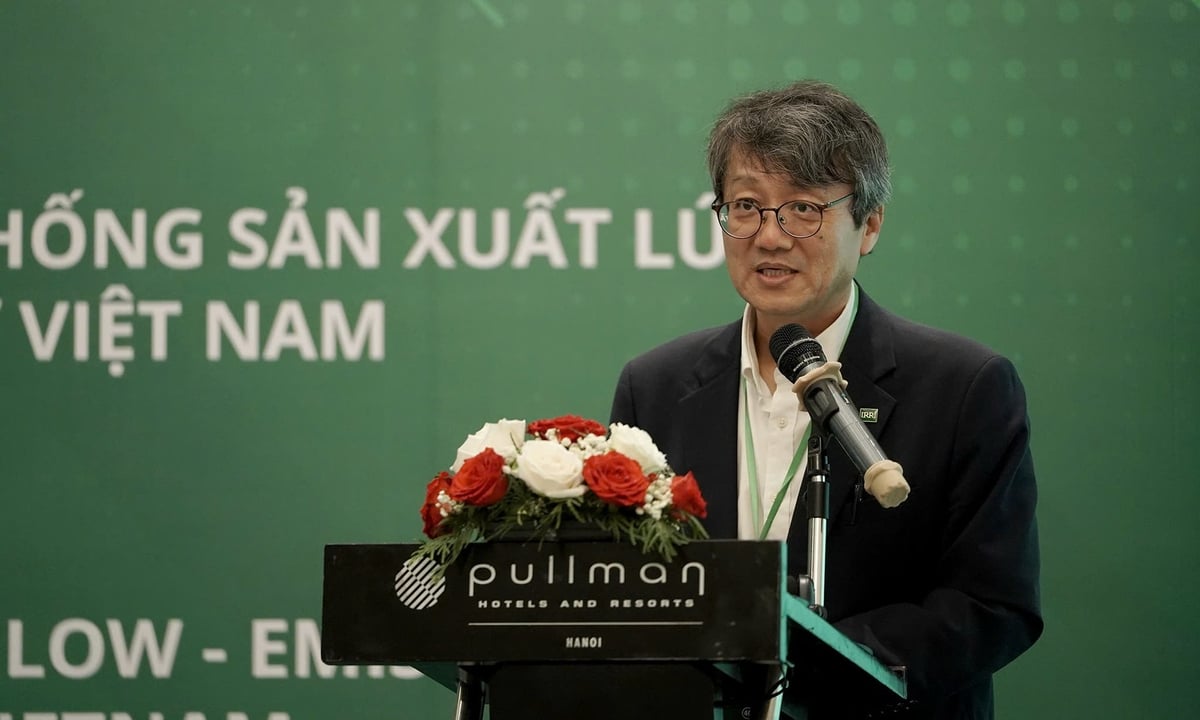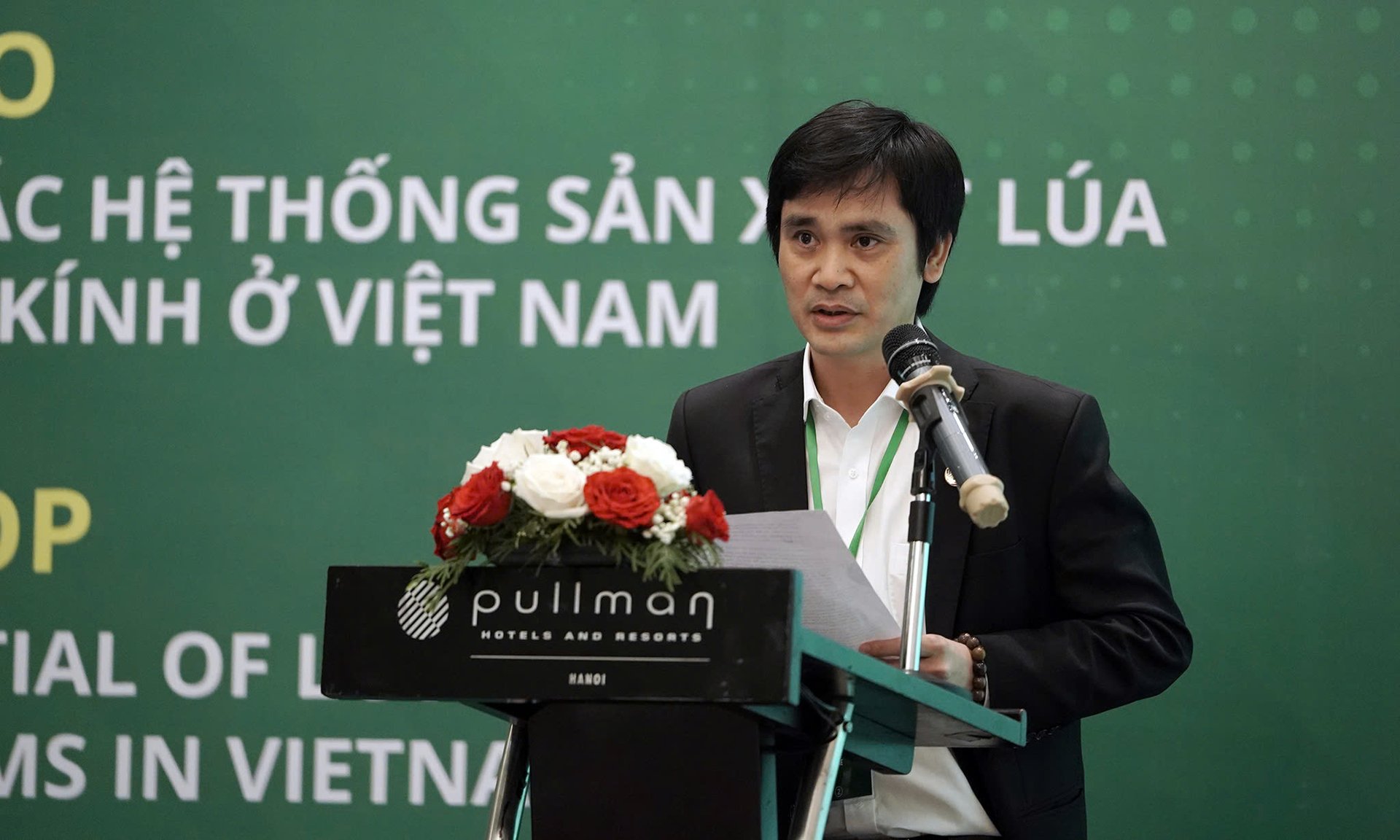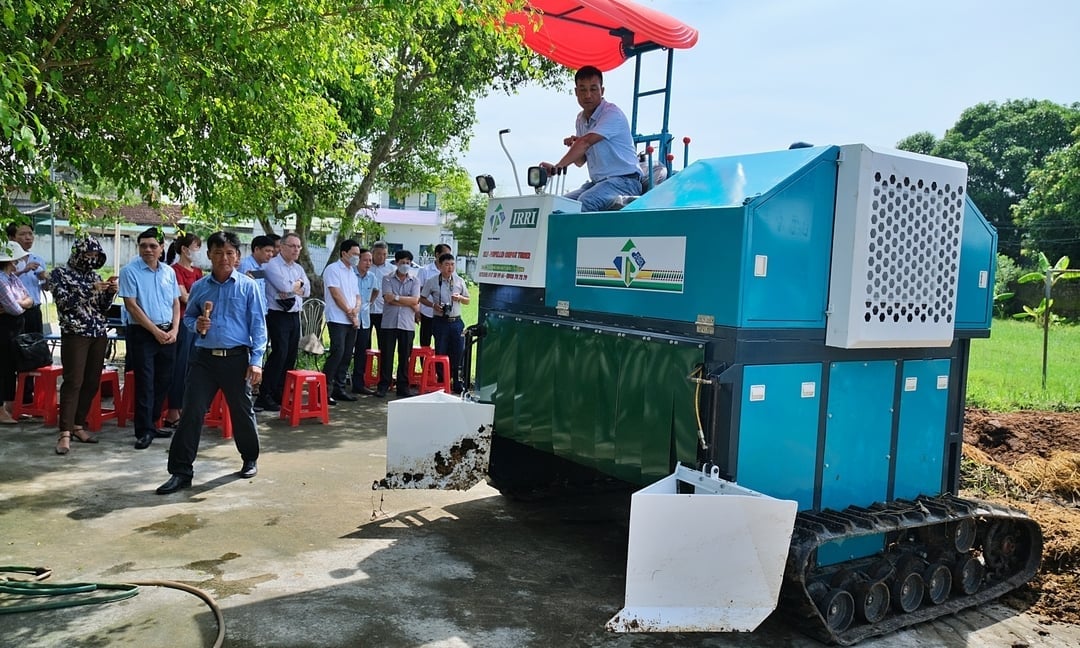November 20, 2025 | 22:10 GMT +7
November 20, 2025 | 22:10 GMT +7
Hotline: 0913.378.918
November 20, 2025 | 22:10 GMT +7
Hotline: 0913.378.918

Dr. Jongsoo Shin, Regional Director for Asia at IRRI, speaking at the workshop. Photo: Bao Thang.
The workshop marked the official launch of the project “Enhancing Coordinated Implementation of Vietnam's NDC in Rice Production Systems," implemented by the International Rice Research Institute (IRRI) with financial support from the Deutsche Gesellschaft fur Internationale Zusammenarbeit (GIZ), in collaboration with the Institute of Strategy and Policy on Agriculture and Environment (ISPAE).
The event laid the foundation for a new phase of cooperation in addressing greenhouse gas (GHG) emissions from agriculture, particularly from rice production, a major contributor to agricultural emissions and with great potential for green transformation.
The workshop emphasized the role of low-emission rice production in achieving Vietnam’s climate change targets. As one of the world’s leading rice exporters, Vietnam is well-positioned to lead the development of sustainable, green rice production models.
A focal point of discussion was the national plan titled “Sustainable development of One million hectares of high-quality, low-emission specialized rice linked to green growth in the Mekong Delta by 2030.” This initiative is regarded as a strategic milestone that reflects Vietnam’s strong commitment to integrating economic development with environmental responsibility.

Dr. Tran Cong Thang, General Director of ISPAE (MAE), speaking at the workshop. Photo: Bao Thang.
Dr. Jongsoo Shin, IRRI’s Regional Director for Asia, stated: “Climate change threatens global food security. Vietnam has tremendous potential to lead the green transformation of the rice sector. This new project will help identify effective policy and institutional mechanisms that generate co-benefits - reducing carbon emissions, enhancing climate resilience, and improving farmers’ livelihoods. The solutions discussed today not only cut emissions but also increase economic returns for farmers.”
Dr. Shin also highlighted the significance of the One Million Hectare Rice Initiative, describing it as a flagship model for advancing sustainable rice cultivation in Vietnam and the broader region.
Dr. Tran Cong Thang, General Director of ISPAE, echoed Dr. Shin’s views, emphasizing that innovation is vital to overcoming today’s challenges, especially given rice’s essential role in Vietnam’s agriculture and global food security. He stressed that innovation must be integrated across policy, science, and practice to ensure the rice sector’s sustainable transformation.
Rice remains a staple crop in Vietnam’s agricultural landscape, serving as a cornerstone for national food security and a pillar of economic development, social stability, and sustainable exports. In 2024, Vietnam exported approximately 9 million tons of rice, generating a record-high revenue of USD 5.66 billion - an achievement underscores the rice sector’s growing significance in the agricultural value chain.

The self-propelled mixer introduced by IRRI has a processing capacity of approximately 138 to 300 cubic meters of rice straw per hour of continuous operation, significantly higher than that of conventional tractor-mounted mixers. Photo: Bao Thang.
However, the sector faces major environmental challenges, particularly regarding greenhouse gas emissions. According to the World Bank, rice cultivation alone accounts for 48% of the total GHG emissions from Vietnam’s agriculture sector and over 75% of its methane (CH₄) emissions. Transitioning to low-emission and sustainable rice production methods is thus critical for Vietnam to fulfill its international climate commitments.
In recent years, Vietnam has accelerated its efforts to reduce GHG emissions from rice production. Notable programs include the VnSAT project, which supported low-emission farming practices across approximately 180,000 hectares. Of particular importance is the One Million Hectare Rice initiative, which is considered the largest and most strategic move in Vietnam’s rice sector toward green transformation.
Mr. Roland Treitler, Principal Technical Advisor at GIZ, praised Vietnam’s recent progress and affirmed that the country is on the right track toward a green and low-emission future. He noted that rice and other key agricultural commodities in Vietnam are undergoing significant transitions thanks to effective partnerships with international stakeholders. According to Mr. Treitler, collaboration among stakeholders - including government agencies, the private sector, and farmers - can generate tangible and long-lasting benefits for all parties involved.
The workshop's outcomes are expected to provide a strong foundation for policy-making and strategic planning toward One Million Hectare Rice project in Vietnam. Following the event, the three organizing institutions plan to conduct further research on region-specific farming methods suitable for Vietnam’s diverse agro-ecological zones. They also aim to expand the network of partners to promote the application of research findings in real-world farming practices.
The workshop was part of a broader framework of cooperation between international organizations and Vietnam to promote sustainable agriculture, ensure food security, adapt to climate change, and reduce greenhouse gas emissions - ultimately supporting the country’s commitments under its Nationally Determined Contributions.
Translated by Huong Giang

(VAN) Amid vast floodwaters, the spirit of sharing and helping others shown by many people in Gia Lai reached tens of thousands of residents stranded by raging floods.

(VAN) Climate change is set to emerge as a key focus of collaboration within the framework of the Comprehensive Strategic Partnership between Viet Nam and New Zealand.

(VAN) Future veterinarians will be the ones directly deciding how antibiotics are prescribed, administered, guided and managed across thousands of farms nationwide.

(VAN) Argentine Ambassador Marcos Antonio Bednarski says Viet Nam is playing an increasingly influential role in Argentina’s economic and technical engagement in Southeast Asia, as Buenos Aires is seeking long-term partners.

(VAN) Prime Minister requested local authorities to use all available measures to reach residential areas that are deeply flooded, cut off, isolated, or affected by landslides.

(VAN) To confront historic flood surge on Ba and Kon rivers, the Prime Minister requested local authorities to mobilize all available forces, evacuate residents, and ensure reservoirs and dams safety.

(VAN) The United Kingdom (UK) has offered to assist Vietnam in accessing significant financial resources to drive agricultural innovation while simultaneously expanding the market for forest-based carbon credits.